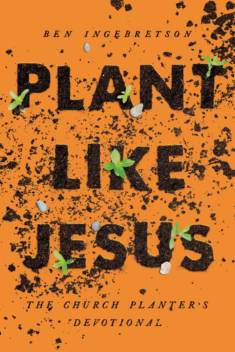Today’s Reflection
It is the nature of our hyper-communication culture for us often to see others’ success as coming quickly. Those stories travel, and it is tempting to feel envious. But the first message that comes from Jesus is to settle in. This means putting aside our regimented schedules and plans (as though we could map all this out and “do” rather than first “be”). First, we make a commitment to know this place and these people—to be fully present in this place. Settling is the first step in planting like Jesus.
—Ben Ingebretson, Plant Like Jesus: The Church Planter’s Devotional (Upper Room Books, 2020)
Today’s Question
When you’re tempted to rush for success, how can you remember to commit, like Jesus, “to be fully present in this place”? Join the conversation.
Today’s Scripture
One man was there who had been ill for thirty-eight years. When Jesus saw him lying there and knew that he had been there a long time, he said to him, “Do you want to be made well?” The ill man answered him, “Sir, I have no one to put me into the pool when the water is stirred up; and while I am making my way, someone else steps down ahead of me.” Jesus said to him, “Stand up, take your mat and walk.”
—John 5:5-8 (NRSVUE)
Prayer for the Week
Teach me, Lord Jesus, to listen as you did. Help me to be slow to speak, slow to judge, and quick to hear. Open my ears so that I can sense both the cry for help around me and your Spirit more clearly, that I might follow you more completely. I pray, in Jesus’ name. Amen.
—Ben Ingebretson, Plant Like Jesus
Submit your prayer to The Upper Room.
Something More
Since 1998, Safe Sanctuaries resources have been a trusted source of guidance for churches and other affiliated institutions as they work to reduce the risk of abuse in their communities. Now, a new and comprehensive resource, Safer Sanctuaries: Nurturing Trust within Faith Communities continues the tradition of Safe Sanctuaries ministry by building on the strong foundation of past resources to inspire and prepare churches for the work of the future. Learn more at SaferSanctuaries.org.
Lectionary Readings
(Courtesy of Vanderbilt Divinity Library)
Looking for lectionary-based resources? Learn more about The Upper Room Disciplines.




2 Comments
I am aware of the idea of being fully present. There are times when I have tried to do just that. Yes, it is very helpful, your focus is centered. Listening is much easier. Thank You, Lord.
Progress is being made toward resolving issues that are holding my son back. Very thankful for that.
Experienced the eclipse yesterday. Amazing.
Prayers for Ally& David, Jill, her family and school; Julie, Megan and h; April, Lou, Rick and Scott, and all NEM posters and visitors. Eastertide blessings.
Larry and Jill, thank you for your nsights yesterday.
Early in my career I absolutely was rushing for success. It was before o became a Christian and while I don’t recall exactly my thoughts then (about 40 years ago) I certain my reaction if someone asked me to be “fully present in this place” I would have said “Yeah, sure, I’ll try it,”’and I would have lasted at most about an hour before I slipped back into the rush. I think notions like that would have seemed great, but not for me.
Now, after 22 years as a Christian, I love the idea of experiencing God and God’s creation fully in the present. Although with the various old translations can be challenging, de Caussade’s book Abandonment to Divine Providence which explains what he calls “the sacrament of the present moment” is definitely worth exploring. That, along with Esther de Waal’s books and John Philip Newell’s writing reinforce the idea of taking time and making effort to slow down and even stop to experience the reality of God’s presence in every moment of this life. How can I remember to be fully present in this place? I think just read enough about this in recent years to keep trying to make it part of how I live according to my faith. Lord, thank you for this guidance and please help me continue to dedicate myself to this.
Add Comment